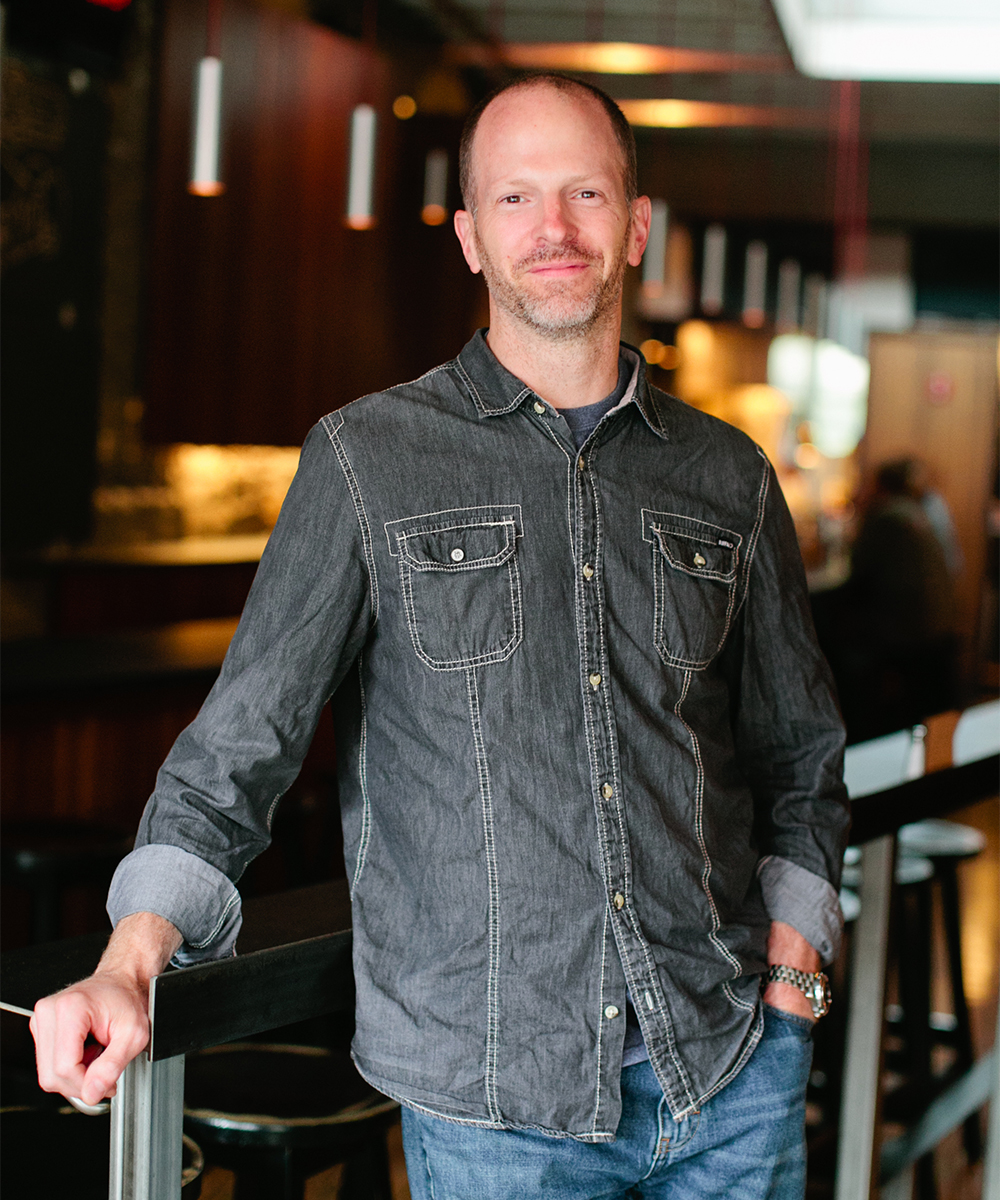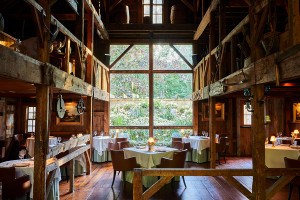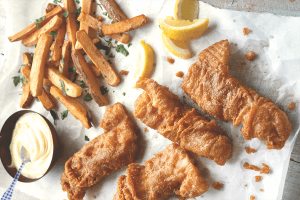Josh Childs on Legacies, Late Nights, and Life After Bartending

Cocktail specialist, Josh Childs, of Silvertone and Trina’s Starlite Loung is retiring from bartending. Photo by Brian Samuels.
Before there was Eastern Standard, Deep Ellum, and Drink, Silvertone was reviving a cocktail culture long dormant in Boston. Josh Childs has now been the face of that downtown institution for 17 years, shaking, stirring, and smiling his way into the good graces of many. He’s influenced countless bartenders, propagated a thriving late-night scene, and helped liberate amaro from the dusty shadows of obscurity.
But Childs is 48 now, and after two rotator cuff surgeries over the past four years, the gangly stalwart has reluctantly decided to retire from life behind the stick. September 30 will mark the last bartending shift for Childs, who will now focus his energies on running the day-t0-day operations of his three area restaurants—Silvertone, Audubon, and Trina’s Starlite Lounge. We caught up with Childs to discuss his beginnings in the trade, the celebrities he’s entertained, the “simple elegance” of the Boilermaker, and the emotions behind his unexpected goodbye.
How did you first get into bartending?
I had a more traditional office job and I was looking to move one. A friend of a friend in Providence offered me a job bussing tables and washing dishes at their restaurant, Amsterdam’s. I really liked it and gradually they got me behind the bar. Then they opened up a location here in Boston. It was there though that I met Nels Clark who works at Privateer Rum now. He opened a place called West Street Grill—this was a long time ago now—but it was the bar of the time. Back in those days, in the early ‘90s, there weren’t very many bars. The big bars of the day were like Biba—Lydia Shire’s place. West Street Grill was one of the first casual, bar-focused places. From there I stayed around Downtown Crossing and worked for some other people until I could get Silvertone up and running.
When did you open Silvertone?
That was in 1997. I was always a believer in the downtown area and now the momentum has finally hit. When we opened Silvertone though, the Hotel Nine Zero was literally rubble and the Suffolk Law School Library building was a hole in the ground. You could see Park Street from our front door. No. 9 Park wasn’t even open quite yet. It’s amazing how different downtown is these days. It’s changed as dramatically as the bar scene has in the last 20 years.
What were some of the more me interesting nights you’ve had behind the bar?
There have been so many great ones, but one that just popped into my head was a night Laurence Fishburne came down. It was just me, my barback, and Laurence Fishburne, and he hung out with us until the bitter end. How often do you get the opportunity to pour Scotch for a guy who’s asking you to call him “Fish”?
When was that?
He was in town filming a movie, I can’t remember which one. It was right after the all the Matrix stuff, so he was really at the top of his game. This is probably 10 years ago now.
Do you remember what he was he drinking?
Lagavulin 16. He had a glass of rocks on the side, and every once in a while, he’d pluck one out and drop it into his Scotch.
Were there other celebrities that stopped by?
I mostly remember all the chefs who have gone on to become famous. Every night, back in the day, we would have Ken Oringer, Barbara Lynch, and Ming Tsai. They were all 16 years younger and they would come down after their shifts. Garrett Harker, before he opened Eastern Standard. One guy who worked with us brought in his nephew to have some meatloaf, kind of a homecooked meal—and that kid was Jamie Bissonnette. We were one of the first places lucky enough to have a late-night industry focus. Now there are a lot of places doing that, but at the time we were one of the few.
Tell me about some of your worst nights? There must have been a few.
Oh god yes! It’s normally when equipment breaks down and your dishwasher is broken and you’ve got a whole room full of people. Actually, when the Celtics finally won the championship in 2008, I was by myself with my buddy Junior, who occasionally comes in to help me bartend on Tuesdays. We thought, “Oh, the celebration is over by the Garden, it won’t be an issue.” But I guess the mayor decided to shutdown all the bars down there. What that did was funnel 20,000 people toward us. Within a five-minute period, we had 200 people coming into the place. Guys were banging on windows and I had to go upstairs and pull our grates down. It was crazy!
I think a lot of people associate you with shots of Fernet Branca and Miller High Life beer backs. How did that start?
That goes back to Garrett Harker and Tom Mastricola at No. 9 Park. They opened about a year after us and they came down after their shift every night. One night they said to me “Josh, will you get Fernet in here?” I didn’t know what the hell that was. Amaro? What is amaro? So, I brought it in here for them. I always joke that they got the idea going and I lit the match down at Silvertone. For a long time we were the number one seller of the stuff because all the restaurant people started doing shots of it. But the Fernet bonfire really happened when Garrett opened up Eastern Standard. While I’d like to take full credit for that, it was really all about Garrett and his San Francisco connection.
At the time, how much Fernet were you selling?
We were doing a case a week. That probably doesn’t seem like that much now, but 15 years ago when nobody knew what it was, that was extraordinary. Bars in the North End might have been doing a bottle a month. Now, of course, places like Eastern Standard, JM Curley, and Citizen Public House, they do considerably more.
Is Miller High Life your contribution to the pairing?
I really think so! When we opened up Silvertone, we were buying six-packs and drinking it during the build-out. Afterward, we just decided to offer it at the bar. The number one beer at the time, in that light lager style, was actually Rolling Rock. That’s crazy, right? What I think ended up happening was that because we were offering something other than Rolling Rock, it became popular. By no means are we solely responsible, but we did play a big part in bringing High Life to prominence among restaurant people.
Are there any signature cocktails people will remember you for?
I’d love to say it were a Boulevardier or something else, but I think it’ll always be a High Life and a shot of Fernet. But honestly, that’s a pretty good legacy because really what that is, is a Boilermaker. While nothing complicated, it’s the most classic cocktail of all. It’s a shift drink all kinds of people order after work, whether you’re a politician, a steel worker, or bartender. I think there’s a simple elegance to that. It’s not a bad legacy.
What’s the injury that is forcing you to end your bartending career?
Embarrassingly enough, I was playing softball of all things. I fell hard going around second base. I didn’t think anything of it at the time, but sure enough, I tore my left rotator cuff pretty badly. So I got that sewed up and I was plodding along my way when my right shoulder started bugging me. I ignored it for a while, then went back to the orthopedic surgeon. He called me back two days later and said, “Josh, I’m so sorry to tell you that you have a tear on your right one now.” The longer I thought about it I realized it was my body telling me that the late nights and long hours behind the bar were over.
What was your reaction when you got the diagnosis?
I was pretty sad to be honest with you. Before it even happened, I was telling my partner Beau [Sturm], I never wanted to be like Willie Mays in the Mets years. It really was like an aging athlete who gets devastating, career-ending news from a doctor. I knew the end was getting closer, but when I’m working the bar I still really enjoy it. I still feel really good. So when I heard that, it was hard news to take. I’m really not going anywhere though, I’ll still be around giving people a hard time. I will miss being behind the bar on a consistent basis, but I also hope people continue to ask me to do charity things and guest shifts here and there.
What are you going to miss the most?
There’s something about going behind the bar and getting your tools out and working this beautiful, finite shift. It’s tangible because you know what you’ve accomplished and who you’ve taken care of. And not to sound too corny, but it’s also the smells of the liquors and the sounds of the ice and the way you hold a julep strainer. Obviously, I won’t be completely removed from that, but there’s something special and unique about being at the helm of the ship.

